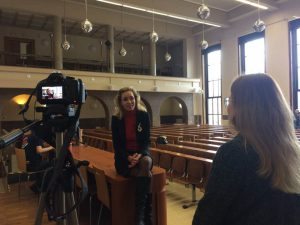LibertyCon Day 2 & 3: Two Days of Friendly Disruption
This year’s European Students for Liberty Conference, now LibertyCon, arguably had the best set of lectures and workshops in the history of this event (which I have been attending from the very beginning in 2011), including both relatively introductory material, advanced lectures and even the projection of a movie. The overarching theme of the conference was the accelerating technological disruption resulting in increasingly distributed, often peer-to-peer economic interactions.
One of the most important and challenging consequences of this phenomenon has been the changing nature of work. Kate Andrews from the IEA kicked off the LibertyCon Saturday by attempting to defuse the fears young people may have about this process. While she admitted that because of the exploding cost of housing, young people may be asset-poor in the short-run, they will probably have a much better lifestyle that will more than make up for it. She mentioned the eye-opening estimates that by 2020, 40% of the US and 50% of the UK workers will be self-employed. And, according to surveys, self-employed people report far higher levels of job satisfaction than their office-bound counterparts. In the working context that will still require that people show up, yet they will probably be paid more to compensate for the lack of flexibility. As a result of this, corporate hierarchies will be increasingly flatter. At the end of the day, entrepreneurship will be increasingly considered to be more important than education, and entrepreneurship (not misguided schemes like the basic income guarantee) will be the key to handling whatever loss of jobs the technological shake-up will cause.
A disruption was necessary amidst the talks on disruption, and the Acton Institute provided it in the form of a documentary on the harmful effects of institutionalized permanent foreign aid that they ingenuously named Poverty.Inc on economic development. The film featured interviews with entrepreneurs whose fortunes were affected by international organizations dumping free stuff on the poor countries’ markets.
[Movie Spoiler]
A particularly powerful story involved a Haitian entrepreneur who, in the aftermath of the disastrous 2010 earthquake, started producing solar-panel-powered street lights in Haiti to the amazement of people there. Then, in a sadly-ironic twist of events, a foreign aid agency, acting on the assumption that the local people were just passive objects of assistance, distributed solar panels for free, almost taking him out of business. His enterprise is a powerful illustration that people in poor countries are capable of sustaining themselves and improving their lives.
[Spoiler over]
The creativity streak was also visible in the keynote speech by Jennifer Grossman from the Atlas Society, which started with a beautiful and moving animated video autobiography of hers. Grossman conveyed the story of how Airbnb allowed her to be what she wanted to be through renting out her beautiful house, and claimed that Airbnb furthers all the major moral principles of objectivism to which she subscribes. In an unexpected move, she even invited audience members to be her guests at her California property in exchange for promoting her work on social media.
One of the cornerstones of the emerging distributed economy powering everything from Amazon’s warehouses to Facebook’s content algorithms, is artificial intelligence (AI), especially machine learning that is currently the dominant approach to AI. Hence, it was natural that there was a lecture devoted to it but I was positively surprised by the advanced level of presentation. Sebastian Kwiatkowski covered issues ranging from the advances in and problems of natural language processing to the potential solutions to the hypothesis selection problem.
The second day of the event ended with the rhetorical feast from Jeffrey Tucker. In a rousing address, Tucker described the history and present of what he calls Right-wing Hegelianism (or simply, fascism) that is the essence of movements from Trumpism to Wilders to Le Pen. Tucker very aptly noted that, while the traditional Left-wing ideology is obviously in decline because it is becoming increasingly clear that the social-democratic approach to social problems has been a failure, liberalism is not guaranteed to win. Fascism, that everyone believed to have disappeared forever, is rearing its ugly face and vying to replace leftism in control of the state.
In the last two series of short talks on Sunday, the speakers whose lectures I chose to attend, Giacomo Zucco and Christian Michel, continued to explore the implications of the rapidly occurring technological progress for the struggle for liberty. Zucco walked the audience through the history of Bitcoin and addressed the culmination of the efforts of the cypherpunk movement that dreams of achieving freedom through cryptography. Michel prophesized that the technological change would finally allow to say ‘good-bye to the Neolithic man’ and the state that grew from the limitations of his life. And according to Michel, this should not happen through the creation of a myriad of smaller political units. What particularly resonated with me was his conviction that we should not be determined by where we were born.
Finally, LibertyCon stuck to the honorable tradition – one of the very few traditions an ardent anti-traditionalist like me can support – of concluding with a lecture by Tom Palmer. His address echoed the urgency expressed the day before by Jeffrey Tucker. He focused on three new major threats to liberty that are sort of best enemies: identity politics, nativist populism (the Alt-Right) and Islamism. Although opposed to each other, all the three strands relish conflict and fuel each other. All three do not recognize people’s right to disagree with them and view the world in general as a zero-sum game. The Alt-Right are particularly dangerous and explicitly statist on all the issues. The underlying thought can be traced back to thinkers like Junger and Schmitt who were as much opposed to individual liberty as marxists.



